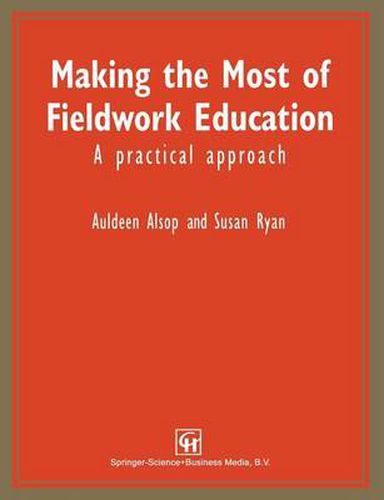Readings Newsletter
Become a Readings Member to make your shopping experience even easier.
Sign in or sign up for free!
You’re not far away from qualifying for FREE standard shipping within Australia
You’ve qualified for FREE standard shipping within Australia
The cart is loading…






This title is printed to order. This book may have been self-published. If so, we cannot guarantee the quality of the content. In the main most books will have gone through the editing process however some may not. We therefore suggest that you be aware of this before ordering this book. If in doubt check either the author or publisher’s details as we are unable to accept any returns unless they are faulty. Please contact us if you have any questions.
Fieldwork education, which combines work-based learning and assessment, has a pivotal place in professional education. It provides a precious opportunity to inte- grate the art, science and ethical practice of Occupational Therapy. The therapeutic milieu is also the most appropriate but difficult setting in which to judge ‘compe- tence to practise’. Yet fieldwork education has not received the attention, resources, research and status it deserves. This is why this book is so important. The focus upon the students’ experience reflects the central tenet of the book: the responsibility, challenge and pleasure of life-long learning. The book covers the whole spectrum of fieldwork in a way which will be of interest to academic and fieldwork educators too. This is achieved through a striking balance between reas- suring, practical advice and scholarliness. The reader is encouraged to enter into current debates, engage in inter-disciplinary and international comparisons and appreciate the tensions between professional issues and organizational contexts. The insights into the logistical, political and educational factors which contribute to the theory-practice gap are noteworthy. In my view, the authors have produced an excellent introduction to fieldwork education, and especially to the complexities of clinical reasoning which is a vital component of initial and continuing competence for many professions. I hope the book will enhance the effectiveness of fieldwork education and thus the quality of health and social care.
$9.00 standard shipping within Australia
FREE standard shipping within Australia for orders over $100.00
Express & International shipping calculated at checkout
This title is printed to order. This book may have been self-published. If so, we cannot guarantee the quality of the content. In the main most books will have gone through the editing process however some may not. We therefore suggest that you be aware of this before ordering this book. If in doubt check either the author or publisher’s details as we are unable to accept any returns unless they are faulty. Please contact us if you have any questions.
Fieldwork education, which combines work-based learning and assessment, has a pivotal place in professional education. It provides a precious opportunity to inte- grate the art, science and ethical practice of Occupational Therapy. The therapeutic milieu is also the most appropriate but difficult setting in which to judge ‘compe- tence to practise’. Yet fieldwork education has not received the attention, resources, research and status it deserves. This is why this book is so important. The focus upon the students’ experience reflects the central tenet of the book: the responsibility, challenge and pleasure of life-long learning. The book covers the whole spectrum of fieldwork in a way which will be of interest to academic and fieldwork educators too. This is achieved through a striking balance between reas- suring, practical advice and scholarliness. The reader is encouraged to enter into current debates, engage in inter-disciplinary and international comparisons and appreciate the tensions between professional issues and organizational contexts. The insights into the logistical, political and educational factors which contribute to the theory-practice gap are noteworthy. In my view, the authors have produced an excellent introduction to fieldwork education, and especially to the complexities of clinical reasoning which is a vital component of initial and continuing competence for many professions. I hope the book will enhance the effectiveness of fieldwork education and thus the quality of health and social care.